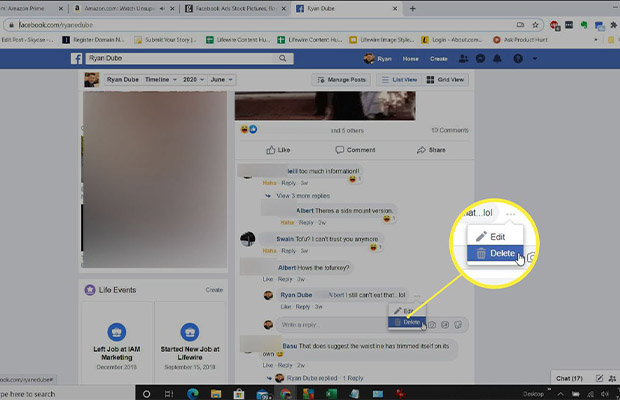Users can respond and leave comments when you run a Facebook advertisement.
However, things become challenging when they are managing multiple profiles, managing multiple ad campaigns, and receiving hundreds of comments on their ad posts. What happens if at least one of those remarks is unfavorable or, worse yet, abusive?
Can you delete comments from FB ads? Generally speaking, you can safely delete comments that are objectively unimportant, unreasonable, or harmful.
Continue reading to learn how to delete comments and when you shouldn’t delete it.
Table of Contents
Do You Need To Delete Comments On Facebook Ads?
In order to effectively communicate with your audience, you should be in control of the tone of your Facebook posts. However, running ads these days often results in the comment section being overrun by unhelpful, spammy, and negative comments.
You can better manage your ad posts by hiding comments on Facebook. You can get rid of the spam and irrelevant comments to maintain the quality of your post and even unhide and respond later on to the relevant comments with a better answer to strengthen your brand reputation.
You should consider hiding comments, such as:
- Spam – These are Facebook comments that contain links that might direct users to malicious and infected websites.
- Self-promotion – How frequently do we see people on advertisement posts attempting to advertise their own website or app?
- Inappropriate content or language – This includes remarks that are sexually explicit or that are racial, homophobic, or sexist.
- Trolls – These are the remarks made by users who are determined to discredit you.
By ignoring such feedback, you run the risk of giving prospective customers a skewed and inaccurate impression of your company, which may ultimately discourage them from ever purchasing your goods or services.

When Not To Delete Comments On Facebook Ads?
Some of the Facebook ad comments you receive should be removed, but others are appropriate to keep. These include:
- Bad reviews and complaints from genuine customers
- Constructive criticism
- Comments that express a personal opinion
Although these remarks are critical of your brand, they are based on real experiences or worries.
Importantly, responding to these comments can boost positive sentiment toward your brand by up to 269% because it demonstrates that you care about what customers think.
Managing these interactions correctly is the trick.
1. Speed Matters
Responding to complaints as soon as possible makes a significant difference because many dissatisfied customers use social media as a last resort.
85% of customers expect you to reply to their comments within 6 hours.
Despite this, many businesses find it difficult to reply to comments on social media. Therefore, even putting forth the effort to ensure that comments don’t get lost can help to distinguish you.
You can quickly respond to comments on your Facebook and other social media posts using Loomly.
2. Put Yourself In The Customer’s Shoes
The worst thing you can do when a customer complains or criticizes your brand is to attempt to shift the blame. Even though you may feel that the criticism is unjust or unwarranted, the customer will experience the negative event as a very real one.
In light of this, attempting to view situations from the perspective of the customer is helpful. Inquire further to learn the truth, and accept responsibility for your errors by saying sorry.
Above all, remember the importance of a thorough explanation. If you believe that a problem isn’t your fault—for instance, if a product hasn’t arrived because the delivery driver was in an accident—explain this.
3. Take It Out Of The Public Eye
Move the conversation to a place that is more private, like your DMs, if the comment is about a customer service issue.
This deflects attention from the problem. Because the customer can share information there that it wouldn’t be wise to share on your main page—like their email address or order number, for example—you can go into more detail.
Without a doubt, DMs sometimes fall short. Offer to jump on a call to further explain the situation or give the customer a deadline by which you’ll contact them with additional information if that works better.
Additionally, it should go without saying that you should follow through on any promises to customers to contact them within a specific time frame. If not, you risk further eroding people’s trust.
4. Offer A Solution
Start by offering your regrets and justifications. But what will you do to make things right?
When a customer’s issue is resolved satisfactorily, they are more likely to remain a customer and are more willing to spend an extra $8 on subsequent purchases. Therefore, it is beneficial in the long run to resolve conflicts to everyone’s satisfaction.
How To Delete Comments From Facebook Ads?
Let’s familiarize ourselves with the delete feature now that you are aware of which Facebook ad comments to delete and which to leave and reply to.
Here’s a step by step guide to deleting comments from your Facebook ads:
Step 1: Find The Comment You Want To Delete
By selecting the drop-down menu for your Facebook notifications, turning the selection to unread, and then selecting the comment, you can go directly to it.
Step 2: In Ads Manager, Select The Ad With The Comments You Want To View
Click the icon next to the ad preview, then click preview.
Choose “Facebook post with comments” from the drop-down menu after that.
Step 3: Click On The Three Dots To The Right Of The Comment You Want To Delete
The drop-down menu will appear. ‘On the list, “Delete” is the first choice.
Step 3: For A Less Permanent Option, Select “Hide Comment”
Only the commenter and their friends will be able to see it, as the name implies, making the comment invisible.
The advantage of using this strategy is that it buys you some time, allowing you to consider whether to delete the comment without running the risk of having your advertisement sullied by a pointless debate.
Final Words
Although Facebook ads allow you to delete comments, this does not necessarily mean you should.
Delete spam, self-promotion, and any other offensive or harmful content with ruthlessness, but see opportunities to improve your brand by learning from negative feedback and criticism.
Read More:




